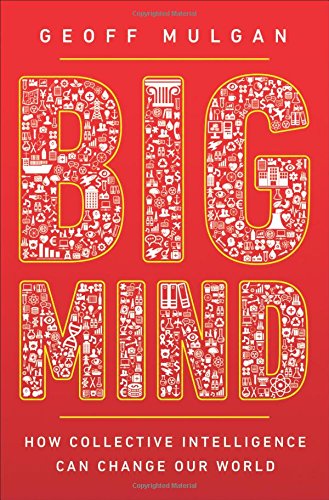
Big Mind: How Collective Intelligence Can Change Our World
- Length: 280 pages
- Edition: 1
- Language: English
- Publisher: Princeton University Press
- Publication Date: 2017-11-28
- ISBN-10: 0691170797
- ISBN-13: 9780691170794
- Sales Rank: #279683 (See Top 100 Books)
A new field of collective intelligence has emerged in the last few years, prompted by a wave of digital technologies that make it possible for organizations and societies to think at large scale. This “bigger mind”―human and machine capabilities working together―has the potential to solve the great challenges of our time. So why do smart technologies not automatically lead to smart results? Gathering insights from diverse fields, including philosophy, computer science, and biology, Big Mind reveals how collective intelligence can guide corporations, governments, universities, and societies to make the most of human brains and digital technologies.
Geoff Mulgan explores how collective intelligence has to be consciously organized and orchestrated in order to harness its powers. He looks at recent experiments mobilizing millions of people to solve problems, and at groundbreaking technology like Google Maps and Dove satellites. He also considers why organizations full of smart people and machines can make foolish mistakes―from investment banks losing billions to intelligence agencies misjudging geopolitical events―and shows how to avoid them.
Highlighting differences between environments that stimulate intelligence and those that blunt it, Mulgan shows how human and machine intelligence could solve challenges in business, climate change, democracy, and public health. But for that to happen we’ll need radically new professions, institutions, and ways of thinking.
Informed by the latest work on data, web platforms, and artificial intelligence, Big Mind shows how collective intelligence could help us survive and thrive.
Table of Contents
Part I What Is Collective Intelligence?
Chapter 1 The Paradox Of A Smart World
Chapter 2 The Nature Of Collective Intelligence In Theory And Practice
Part II Making Sense of Collective Intelligence as Choice
Chapter 3 The Functional Elements Of Collective Intelligence
Chapter 4 The Infrastructures That Support Collective Intelligence
Chapter 5 The Organizing Principles Of Collective Intelligence
Chapter 6 Learning Loops
Chapter 7 Cognitive Economics And Triggered Hierarchies
Chapter 8 The Autonomy Of Intelligence
Chapter 9 The Collective In Collective Intelligence
Chapter 10 Self-Suspicion And Fighting The Enemies Of Collective Intelligence
Part III Collective Intelligence in Everyday Life
Chapter 11 Mind-Enhancing Meetings And Environments
Chapter 12 Problem Solving: How Cities And Governments Think
Chapter 13 Visible And Invisible Hands: Economies And Firms As Collective Intelligence
Chapter 14 The University As Collective Intelligence
Chapter 15 Democratic Assembly
Chapter 16 How Does A Society Think And Create As A System?
Chapter 17 The Rise Of Knowledge Commons: It’S For Everyone
Part IV Collective Intelligence as Expanded Possibility
Chapter 18 Collective Wisdom And Progress In Consciousness







